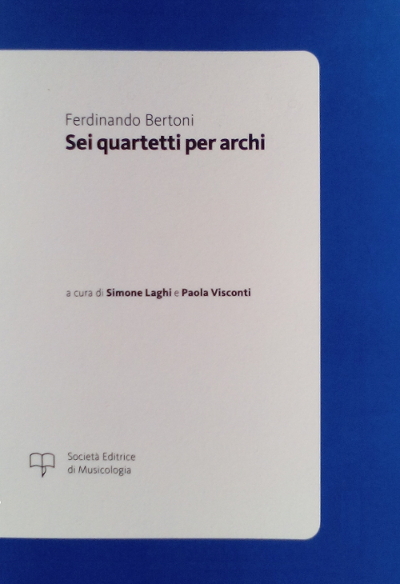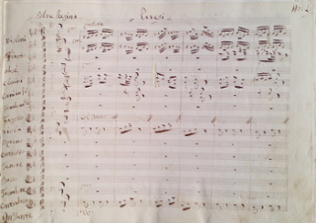Projects
musicologyPublications
Ferdinando Bertoni, Six string quartets
Ed. by Simone Laghi and Paola Visconti
Ferdinando Bertoni (1725-1813), pupil of G. B. Martini, spent most of his life in Venice, where he was choir master at the Pio Ospedale dei Mendicanti, then first organist and subsequently chapel master in San Marco. Particularly prolific as a composer of large sacred and prophane vocal compositions, his chamber music output is on the contrary quite scarce. Bertoni wrote about ten compositions for keyboard, the Six sonatas for the harpsichord or piano forte with an accompaniment for violin and the Six Quartetto's for two Violins, a Tenor and a Violoncello. The two main collections were published in London, where Bertoni lived during the staging of some of his operas. The six string quartets are dedicated to Sir William Beckford, philanthropist and patron, fond of Italy and great admirer of the Venetian composer. The circulation of this collection moved beyond the narrow circle of London salons: the first edition (Bremner, 1782, printed for the author) was promptly followed by an Italian reprint (Zatta, 1782), on the same plates which Bertoni presumably brought back with him to Venice. A later edition appeared in Paris (Venier, 1782/84), which bears some differences from the previous ones, but for which it is not possible to prove an involvement of the author.
Buy online English text available
Other critical editions
The critical edition is rigorous scientific procedure with the aim of rebuilding a score as close as possible to the composer’s original concept. The main source (usually the autograph score when available) is curated together with the secondary sources. The critical edition highlights the variations among these sources, applying editorial criteria and explaining the choices made along the way.
Salve Regina for Soloists, Chorus and Orchestra by Stefano Pavesi: critical edition of two versions
Master's degree thesis, Musicology, Cremona University, a. y. 2006 - 2007
Salve Regina, composed in 1820, is one of the most significant sacred music productions of Stefano Pavesi
(1779-1850) from Crema.
It was well received up to 1881 and was often performed in both Milan and Vienna. It was then neglected despite the fact the incipit
was engraved at the base of Pavesi’s bust, which is still visible today in Crema’s Piazza del Duomo.
This thesis begins with a general
overview of 19th Century music, with a more specific focus on that of Crema. It also retraces Pavesi’s biography looking in depth at his
activity as maestro di cappella in Crema and examines historical documentation pertaining to Salve Regina, from its creation to its latest
performances.
Ferdinando Bertoni: critical edition of some keyboard pieces
Master's degree, Piano performance, "Luca Marenzio" Conservatorium, Brescia, a. y. 2012 - 2013
Stefano Pavesi. Gloria for Soloists, Chorus and Orchestra: critical edition
Current works
Ruggero Giusti, Pezzi infantili
Piano transcription for 2 and 4 hands for didactical purposes. The 4-hands pieces have been transcripted for two pupils (same difficulty level).
Ateneo di Salò
Cataloging of library's musical section.
Six sonatas for the harpsichord or piano forte with an accompaniment for violin by Ferdinando Bertoni
Critical edition.

